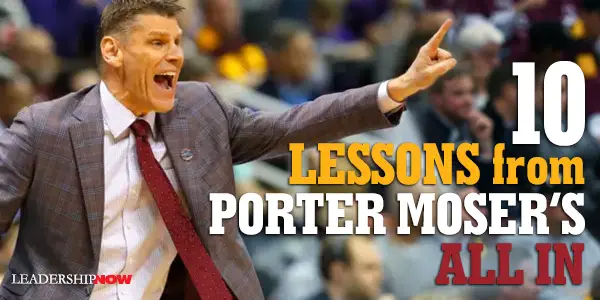10 Lessons from Porter Moser’s All In

PORTER MOSER is the head men's basketball coach at Loyola University Chicago. Known for what he does on the court, he has guided the Loyola-Chicago Ramblers to three post-season berths, including a historic run to the 2018 NCAA Final Four and back-to-back MCV regular-season championships in 2018 and 2019. But it is his reputation and impact for what he does developing people off the court that is his legacy.
In All In: Driven by Passion, Energy, and Purpose, he shares the values and beliefs, the ups and downs of his career, and the lessons he has taken from them. All In is filled with wisdom and lessons from a life leading others to their potential. I’ve extracted some of them for our mutual benefit:
How you think is how you feel, how you feel is how you act, and how you act is what defines you. I believe completely in the progression of these three statements. If you’re thinking good thoughts, you’re going to have a bounce in your step. You’re going to act in a certain way. Likewise, if you’re thinking negative thoughts, if you have a “poor me” attitude, that’s how people will perceive you.
Talk to yourself, don’t listen to yourself; feed yourself with positive encouragement; and chose faith instead of fear.
We have a team rule: “No complaining, no excuses, and no entitlement.” It helps us guard against energy vampires. But there is a difference between being an energy vampire and lacking confidence. As a coach, I think it is important to sense when a player lacks confidence. When I see that happening, I’ll do what I can to lift him up. There is also a difference between being an energy vampire and being stressed. Sometimes we’re negative because we’re stressed. The key to preventing stress from turning you into an energy vampire is learning how to manage it.
Adversity doesn’t define us; how we respond to adversity does. Character is how you respond when things don’t go your way. I have a mantra: “Fall seven, rise eight.” (It’s also a line from Proverbs 24:16—“though they fall seven times, they will rise again.”) No matter how many times I might fall, I always remind myself to get up, to keep fighting, to persevere.
When you’re humble—when you admit your mistakes—you build trust. You show that, in the end, you’re concerned with something beyond your own accomplishments or achievements.
Perseverance is continued effort in the face of difficulty. Resiliency is seeing the problem and adjusting to that difficulty. Perseverance is strength; resiliency is strategy.
Being competitive means that you find a way to realize your vision. If one path closes, you find another one.
When you feel entitled, you think that you don’t need to contribute, and you don’t worry about what value you bring to the table.
Mentorship is an important part of being a professional. I want my assistants to know that I am trying to help them do their jobs; I want my players to know that I want them to be successful student-athletes.
Sometimes when people are giving you advice, they are telling you what’s important to them, not what’s important to you. That’s when you need people in your circle of influence who truly care about your happiness and can help you reaffirm what’s important to you.
* * *

Like us on
Instagram and
Facebook for additional leadership and personal development ideas.
* * *




Posted by Michael McKinney at 03:36 PM
Permalink
| Comments (0)
| This post is about Leadership
, Teamwork










